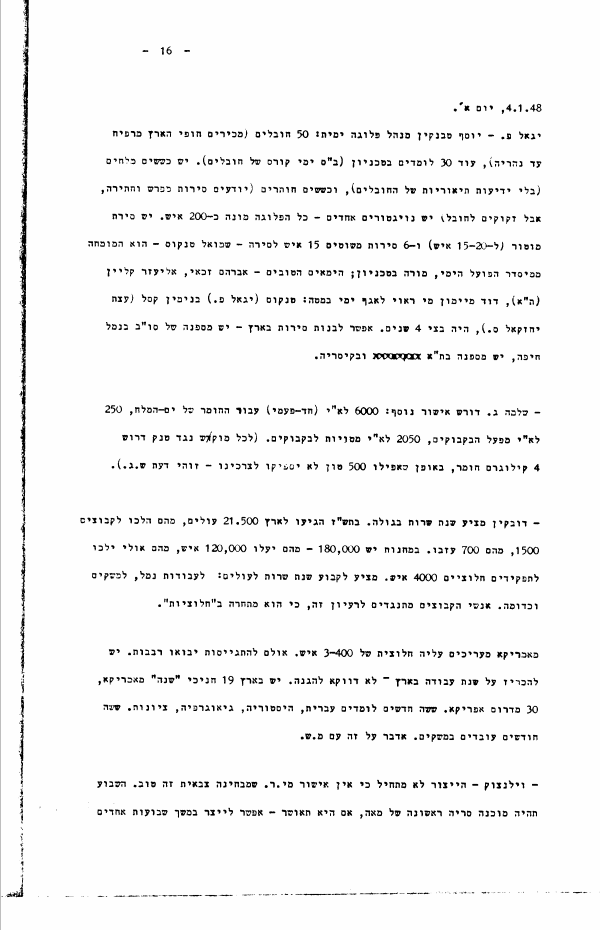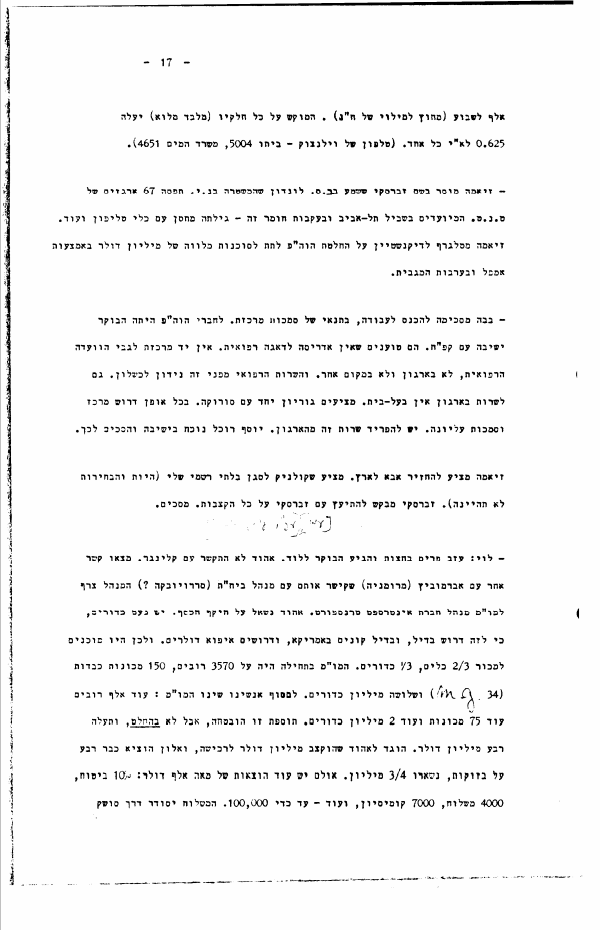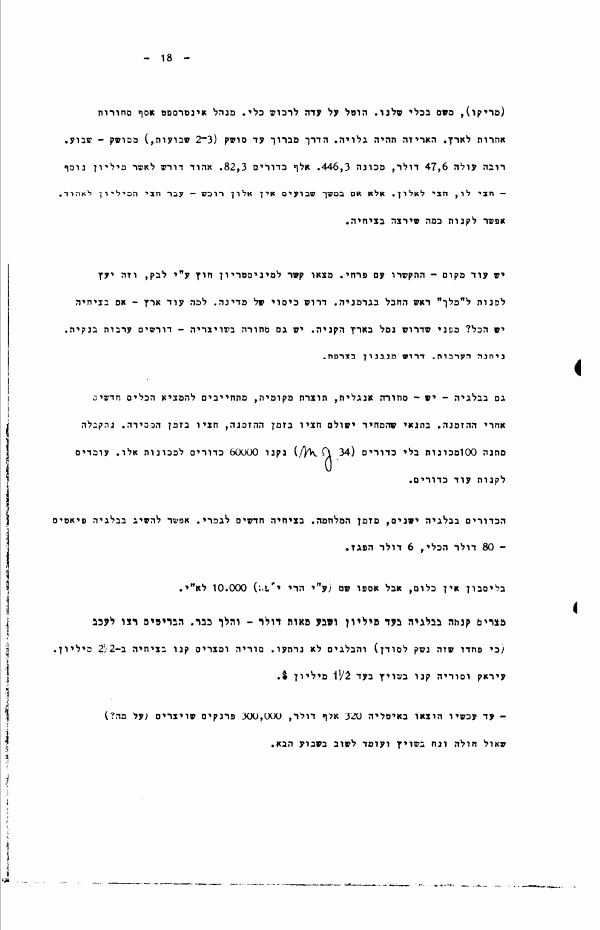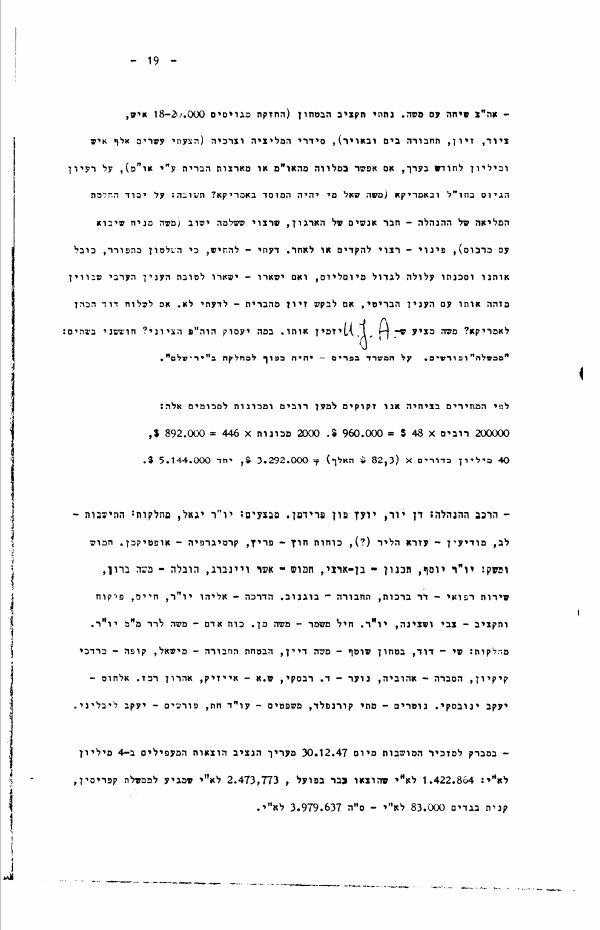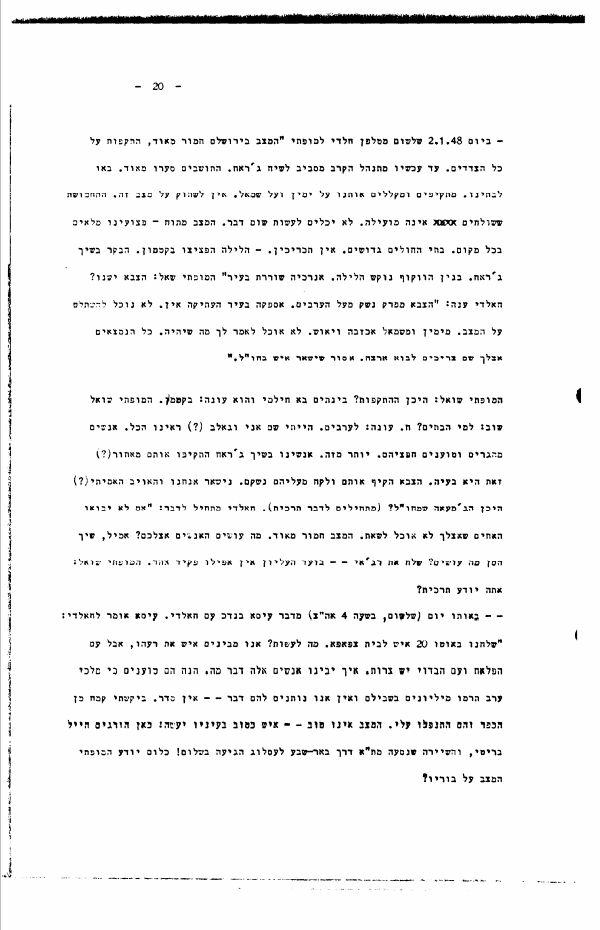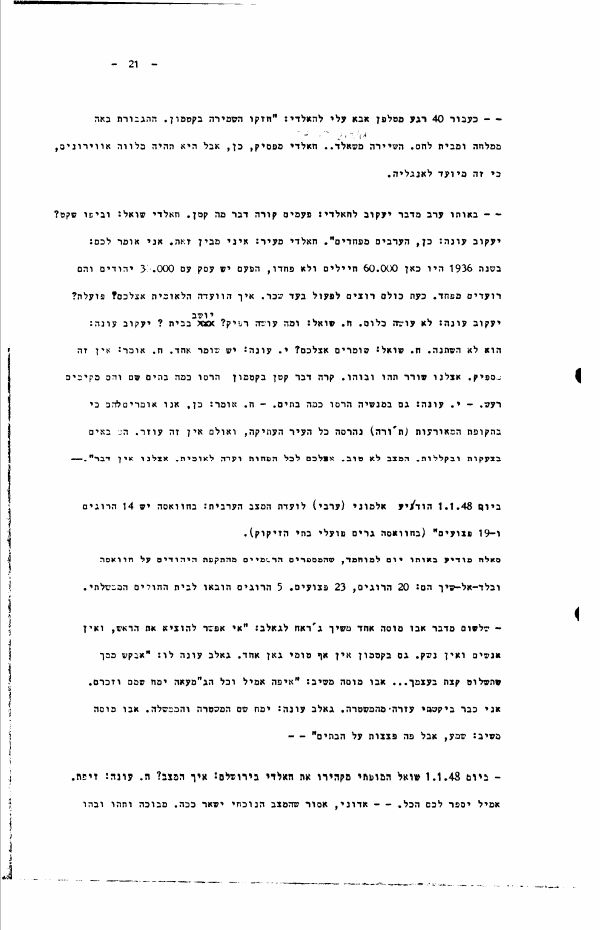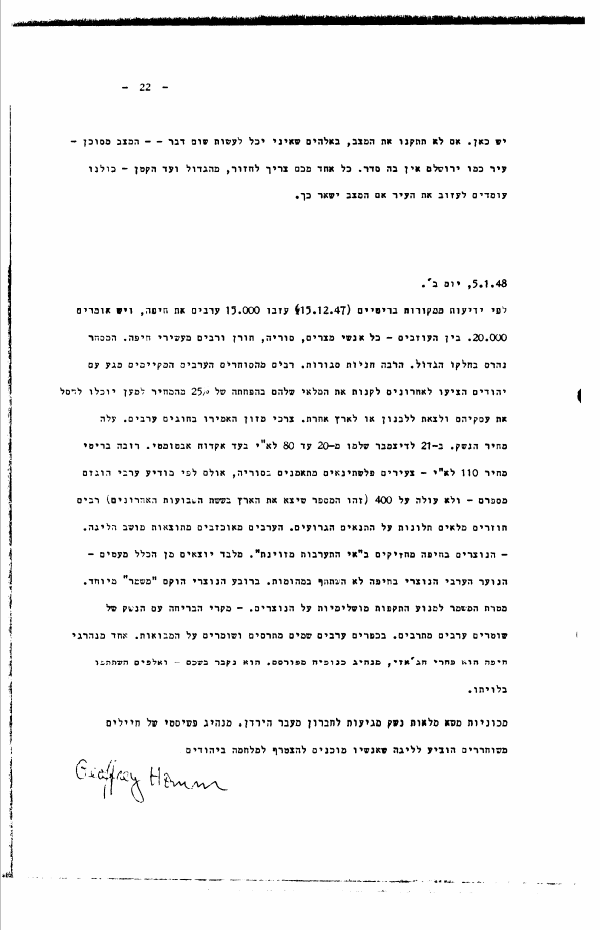Sunday, January 4, 1948
Yigal P. [Alon]: Yosef Tabenkin, supervisor of the [Palmach] Naval Company: 50 naval officers (familiar with the country's shores from Rafiah to Nahariya), another 30 studying at the Technion (naval school, naval officers course). There are about sixty sailors (without the theoretical knowledge of naval officers), and about sixty oarsmen (they know sailboats and rowboats, but need an officer), there are a few navigators - the entire company numbers about 200 men. There's a motorboat (for 15-20 men) and 6 rowboats, 15 men per boat.
Shmuel Tankus - one of the founders of the naval "HaPo'el"; he's an expert, a teacher at the Technion; the good seamen - Avraham Zakai, Eliezer Klein [Tal] (Tel Aviv), and David Maimon. Who's suitable for the naval branch in the Staff [General Staff]? Tankus (Yigal P. [Alon]'s suggestion); Benjamin Kessel (Yehezkel Sahar's suggestion), was in the [British] navy for four years.
It's possible to build boats in the country - there's a shipyard belonging to S. B. [Solel Boneh], there are shipyards in Tel Aviv and Caesarea.
- Shlomo G. [Gur] requires additional authorization: P£ 6,000 (one-time [payment]) for the Dead Sea material, P£ 250 the [anti-armor] bottles [Molotov cocktails] factory, P£ 2,050 rags [wicks] for the bottles (each anti-tank mine requires four kilograms of material, so that even 500 tons won't meet our needs - this is S.G.'s opinion).
- [Eliahu] Dobkin proposes [announcing] a year of service in the Golah [Exile, i.e., Diaspora]. In [the Jewish year] 5,707 [September 1946 - September 1947] 21,500 new immigrants arrived in the country, 1,500 of them went to kibbutzim, 700 left. In the camps [in Europe] there are 180,000 - of these 120,000 people will immigrate. 4,000 of them might take on halutzi [Zionist pioneering] roles. He suggests establishing a year of service for new immigrants: working in the port, settlements, and the like. The kibbutz people opposed this idea, because it competes with "halutziyut" [the Zionist pioneering spirit].
The halutzi ''aliya from America is estimated at 300-400 people. But for enlistment [military service] multitudes will come. Need to announce a work-year in the country - not necessarily for defense. In the country there are 19 "year-long students" from America. 30 from South Africa. For six months they study Hebrew, history, geography, Zionism. For six months they work in the settlements. I'll discuss this with Moshe [Sharett].
- Vilenchuk: The production [of mines] hasn't begun because there's no confirmation from Yosef [Avidar] that the product is good from a military perspective. This week a first series of 100 [mines] will be ready. If it's approved - then it will be possible to produce 1,000 per week over the course of a few weeks (aside from the E.M. [explosive material[?]] supply). The mine with all its parts (aside from the filling) will cost P£ 0.625 each. (Vilenchuk telephone - home 5004, water office 4651)
- Ziama [Aran] conveys on behalf of Zabrasky that he heard on London radio that the police in New York [actually - New Jersey] seized 67 crates of TNT destined for Tel Aviv, and following this material - discovered a warehouse with telephone devices and more.
Ziama is telegraphing Dickenstein regarding the [Zionist] General Council decision to give the [Jewish] Agency a $1 million loan via Ampal [the American-Palestine Trading Corporation, a US-based financial company founded by the Histadrut] guaranteed by the UJA.
Bebe [Idelson] agrees to take on the work [on the Committee for the Conscript], on the condition of coordinating authority.
The members of the [Zionist] General Council had a meeting this morning with Kupat Holim [the healthcare network]. They claim there's no address for medical concerns [for conscripts]. There's no coordinating entity with regard to the medical committee, neither in the "Organization" [Haganah] nor elsewhere, and the medical service is therefore doomed to fail. The [medical] service in the "Organization" also lacks a landlord. They propose [Yosef] Gurion along with [Moshe] Soroka [of Kupat Holim]. In any case, there is a need for a coordinator and supreme authority, and this service needs to be separated from the "Organization." Yosef Rochel [Avidar] was present at the meeting and agreed to this.
Ziama suggests bringing Abba [Eban] back to the country. He proposes Shkolnik as my unofficial deputy ("given that elections won't be held").
Zabrasky [should be: Ziama] asked to consult with Zabrasky regarding all the [budgetary] allocations. [I] agree.
- Levi [Argov]: Left Paris at midnight and arrived in Lod this morning. Ehud [Avriel] did not contact Klinger. They found another connection with Abramowitz (from Romania), who put them in contact with a manager at the Zbrojovka factory. The manager brought the manager of Intercept Transport into the negotiations.
Ehud was asked about the extent of funds. [The Czechs] have few bullets, because this requires tin, and tin is bought in America, which therefore requires dollars. So they were willing to sell 2/3 instruments, 1/3 bullets. The negotiations initially were for 3,570 rifles, 150 heavy machine [gun]s (MG-34), and 3 million bullets. Ultimately our men changed the negotiations: another thousand rifles, another 75 [heavy] machine [gun]s, and another 2 million bullets. This addition was promised, but not absolutely, and will cost a quarter of a million dollars.
Ehud was told that the purchase was allocated $1 million, and Alon has already spent a quarter on bazookas. There remain ¾ million. But there are additional expenses of $100,000: 10% insurance, 4,000 shipment, 7,000 commission, etc. - up to 100,000. The shipment will be arranged through Sušak (from Rijeka), from there via a vessel [ship] of ours.
Ada [Sereni] was tasked with buying a vessel [ship]. The Intercept manager assembled other goods for the country. The container will be visible. The journey from Brno [capital city of Moravia, Czechoslovakia] to Sušak (2-3 weeks), from Sušak - a week.
A rifle costs $47.6, a [heavy] machine [gun] 446.3. A thousand bullets 82.3. Ehud requests authorization for another million - half for him, asked for Alon. But if Alon makes no purchase over the course of two weeks - the half-million goes to Ehud. In Czechoslovakia [we] can buy as much as we want.
There's another place [for procurement]: [They] contacted Farhi [France], found a connection to the Foreign Ministry through "Lavan" [Blanchard, of the French intelligence service], who suggested approaching the king, head of the region in Germany [General Koenig, military governor of the French occupation zone in Germany]. Need the cover of a state [as buyer].
Why another country - if Czechoslovakia has everything? - Because it's necessary to have a port [of departure] in the country of purchase. There's also merchandise in Switzerland - need a bank guarantee. The guarantee was given. Need a mechanism [for procurement] in France.
In Belgium too - there's English merchandise [weaponry], local production. They promise to present the instruments two months after the order, on the condition that half the cost is paid at the time of the order, half at the time of delivery. Received a gift of 100 (MG-34) machine [gun]s without bullets. 60,000 bullets were brought for these machine [gun]s. They're going to buy more bullets.
The bullets in Belgium are old, from the time of the war. In Czechoslovakia they're completely new. PIATs are available in Belgium - $80 for the instrument, $6 for the shell.
In Lisbon there's nothing, but P£ 10,000 was collected there (by Harry Joffe).
Egypt bought [weapons and equipment] worth a million and seven hundred [thousand] dollars in Belgium - already gone [sent]. The British wanted to delay (because they were afraid these were weapons for Sudan) and the Belgians weren't deterred. Syria and Egypt spent 2½ million in Czechoslovakia. Iraq and Syria spent 1½ million in Switzerland.
In Italy so far 320 thousand dollars have been spent, 300,000 Swiss francs (on what?).
Shaul [Avigur] is sick and resting in Switzerland. Will return next week.
- In the afternoon a conversation with Moshe [Sharett]. I gave [him the details of] the defense budget (upkeep of recruits 18-20,000 men, equipment, armament, sea and air transport). Arrangements and needs of the militia (I suggested 20,000 men and approximately P£ million per month - if possible as a loan from the UN, or from the United States by the UN). On the idea of recruitment abroad and in America (Moshe asked, "Who will be the [recruiting] institution in America?" Answer: based on a decision of the Executive plenary - a group of men from the "Organization" [the Haganah]. It would be good if Shlomo [Shamir] returned (Moshe assumes he'll come [to the country] with [Colonel] Marcus).[)].
The [British] withdrawal - is it desirable to move up or postpone?
My opinion - to expedite, because a crumbling government ties our hands and the danger it poses could increase daily, and if they stay - they'll stay in support of Arab interests, which Bevin equates with British interests.
Should we request armament from the Union [Russia]? - In my view no.
Should David Hacohen be sent to America? Moshe suggests that the UJA invite him.
What will the Zionist [General Council] focus on? - I fear two matters: "government" [the composition of a government] and the secessionists. The office in Paris - will be subordinate to the [Political] Department in Jerusalem.
Given the prices in Czechoslovakia, we need, for 200000 [should be: 20,000] rifles 𝖷 $ 48 = $ 960,000. 2000 machine [gun]s 𝖷 446 = $ 892,000. 40 million bullets 𝖷 (82.3 thousand) = $ 3,292,000. All together $ 5,144,000.
- The composition of the Administration [of the General Staff]: Dan [alias for Ya'akov Dostrovsky -Dori] Chairman [chief of staff]; Advisor - von Friedmann [Eitan Avissar].
Operations [Branch]: Chairman - Yigael [Yadin]. Departments: Settlement - [Raphael] Lev; Intelligence - Ezra Helmer [Omer]; Foreign Forces: Fritz [Shalom Eshet]; Cartography - Aptekmann [Pinhas Yoeli].
Armament and Provisions [Branch]: Chairman - Yosef [Avidar]. Departments: Planning - [Ephraim] Ben-Artzi; Armament - Asher Weinberg [Asher'ke Peled]; Transportation [of weapons] - Moshe Baron; Medical Service - Dr. [Daniel] Brachot; Transport - Boganov [Israel Barnea].
Training [Branch] - Chairman Eliahu [Cohen-Ben-Hur], Haim [Laskov].
Oversight and Budget [Branch] - Zvi Lashchiner [Ayalon], Chairman.
Guard Corps - Moshe Mann.
Personnel [Branch]: - Moshe Lehrer [Zadok], interim chairman.
Departments: SHAI - David [Shaltiel]; Routine Defense - Moshe Dayan; Transport Security - Mishal [Schechter-Shacham]; Treasury - Mordehai Kikayon; Hasbara [explanation, public relations] - Ahuvia Malkin; Youth - D. Rabsky [David Reshef]; A.S. [Air Service] - Eizik [Yehoshua Eshel], Aharon Remez; Wireless - Yaacov Yanovsky [Yannai]; notrim [British-appointed guards] - Mati Kornfeld [sp.] [Dagan]; Law - Adv. [Nahum] Het; Secessionists - Jacob Lublini.
In a cable dated December 30, 1947, to the Colonial Secretary [Secretary of State for the Colonies], the Commissioner assesses the costs of [handling] the ma'apilim [clandestine immigrants] at P£ 4 million: P£ 1,422,864 already expended, P£ 2,473,773 owed to the government of Cyprus, purchase of clothing P£ 83,000 - in total P£ 3,979,637.
- On January 2, 1948, (two days ago) [Dr.] Khalidi [sp.] telephoned the Mufti [in Cairo:
"The situation in Jerusalem is very bad, attacks on all sides, the battle surrounding Sheikh Jarrah is still underway now. The residents were very angry. They came to our homes, attacking and cursing us every which way. This situation must not be kept quiet. The ammunition being sent is not enough. They cannot do anything. The situation is tense - our wounded are filling up everywhere. The hospitals are congested. There are no shrouds. Last night [the Jews] shelled Katamon, this morning Sheikh Jarrah. The Waqf building was hit at night. There's anarchy throughout the city."
The Mufti asks: "Is the [British] army there?"
Khalidi answered: "The army is disarming the Arabs of weapons. Supplies are not reaching the Old City. We cannot gain control of the situation. Disappointment and despair to the right and to the left. I can't tell you what will happen. All those who are with you need to come to the country. No one must remain abroad.
The Mufti asks: "Where are the attacks?"
In the meantime [Ahmed] Hilmi arrives and he answers: "In Katamon."
The Mufti asks again: "To whom [do] the houses [belong]?"
Hilmi answers: "To Arabs." I was there, Galeb (?) [the parenthetical question marks are Ben-Gurion's] and I saw everything. People are emigrating and loading up their possessions. More than that: our people in Sheikh Jarrah, they were attacked from behind (?). This is the problem; the army surrounded them and took their weapons from them. We and the real enemy remain (?). Where are the jama'a [friends] from abroad? (They start speaking Turkish).
Khalidi begins speaking: "If the brothers who are with you do not come, I won't be able to manage. The situation is very bad. What are the men with you doing? Emil [Gouri], Sheikh Hassan [Abu Saud] what are they doing? Send Rajai [al-Husayni]. In the [Arab] Higher Committee there isn't even one official."
The Mufti asks: "Do you know Turkish?"
That day (two days ago, at 4 p.m.) Issa Bandak [mayor of Bethlehem] speaks with Khalidi.
Issa tells Khalidi: "We sent 20 men by car to Beit Safafa. What can we do? We understand each other, but there are problems with the Fellah [peasant] and the Bedouin. How will these people understand anything? For example they claim that the kings of Arabia donated millions for them, and were not giving them anything. There's no order. I asked for flour from the village and they pounced on me. The situation isn't good, everyone does as they wish; [the Jews] kill a British soldier, and the convoy that was traveling from Tel Aviv by way of Beersheva to ''Isluj [Revivim] arrived unharmed! Does the Mufti have any idea about the real situation?"
40 minutes later Abu Ali telephones Khalidi: "Strengthen the security in Katamon. Reinforcement is coming from Malha and Bethlehem. The convoy from Potash [the Dead Sea] [is getting closer]."
Khalidi interrupts him: "Yes, but it will be accompanied by airplanes, because it is intended for England."
That evening Yacoub [presumably Farraj, who remained in Jaffa] speaks with Khalidi: "Twice something small happened [in the city]."
Khalidi asks: "And it's quiet in Jaffa?"
Yacoub answers: "Yes, the Arabs are afraid."
Khalidi comments: "I don't understand this. I tell you: in 1936 there were 60,000 soldiers [and Arabs] weren't afraid; this time they're dealing with 30,000 Jews and they're trembling in fear. These days everyone wants to a salary for taking action. How is your national committee operating?"
Yacoub answers: "Not doing anything."
Khalidi asks: "And what is Rafiq [Tamimi, of Jaffa] doing? Sitting at home?" - Yacoub answers: "He hasn't changed."
Khalidi asks: "Do you have guards?" - Yacoub answers: "There's one guard."
Khalidi says: "That's not enough. Here it's chaos. Something small happened in Katamon, a few houses were destroyed there, and they're causing an uproar." Yacoub answers: "In Masmiyya too, a few houses were destroyed."
Khalidi says: "Yes, we tell them that at the time of the Me'ora'ot (Thawra) ["Events" - the Arab uprising of 1936-1939] the entire Old City [of Jaffa] was destroyed but it doesn't help. They shout and curse. The situation isn't good. You at least have a national committee. We have nothing."
On January 1, 1948, someone anonymous (Arab) informed the Arab Situation Committee: "In Hawassa [a neighborhood in Haifa] there are 14 killed and 19 wounded" (the refinery workers live in Hawassa).
That day Salah informs Muhammad that the official numbers from the Jewish attack on Hawassa and Balad al-Sheikh are: 20 killed, 23 wounded. 5 of those killed were brought to the government hospital.
Two days ago Abu Moussa, someone from Sheikh Jarrah, spoke with Galeb:
"One can't stick one's head out. There are no men and no weapons. Even in Katamon there isn't a single Tommy gun."
Galeb tells him: "I ask you to exercise a little self-control…"
Abu Moussa replies: "Where are Emil [Gouri] and all the jama'a [friends], damn them. I've already asked for help from the police."
Galeb answers: "Damn the police and the government."
Abu Moussa replies: "But listen, houses are being shelled here."
On January 1, 1948, the Mufti, in Cairo, asks Khalidi in Jerusalem: "How's the situation?"
Kh. [Khalidi] answers: "Rubbish. Emil will tell you everything. Sir, the present situation must not continue. There's confusion and chaos here. If you don't rectify the situation, by God I won't be able to do anything - the situation is dangerous - a city such as Jerusalem with no order. Every single one of you needs to come back, from the grand to the minor [person]. Everyone is going to leave the city if the situation stays like this."





